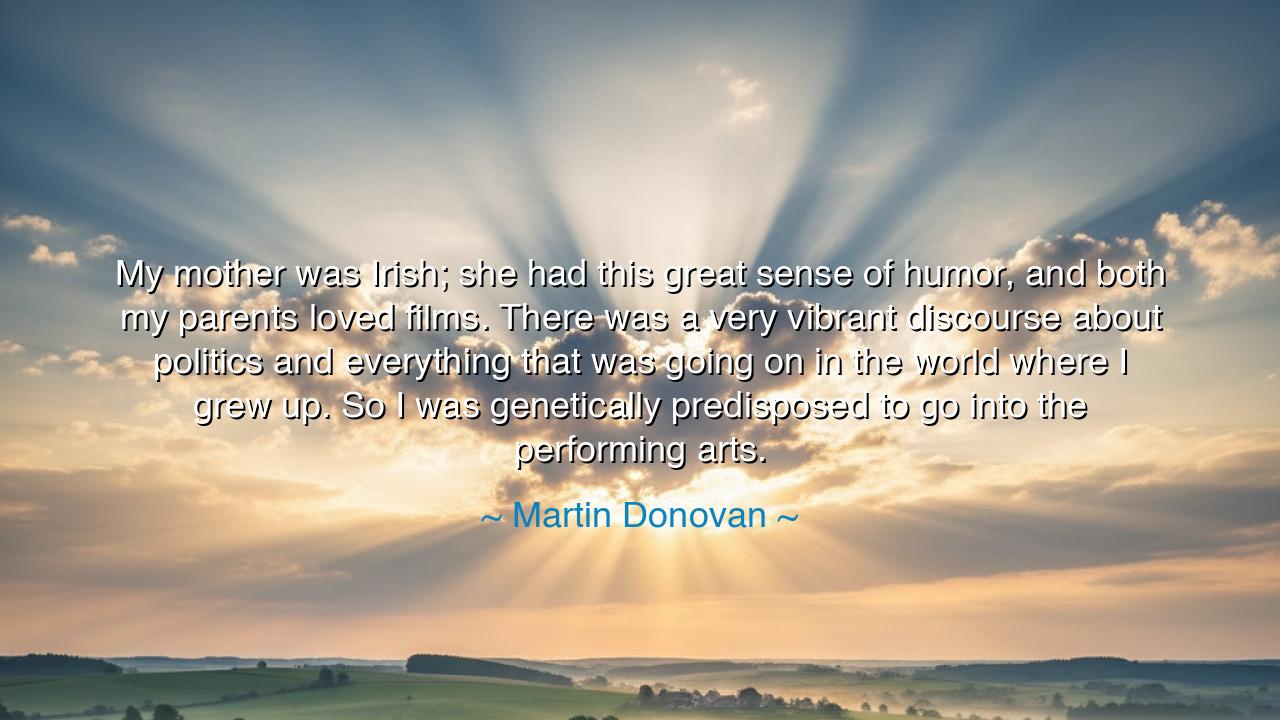
My mother was Irish; she had this great sense of humor, and both
My mother was Irish; she had this great sense of humor, and both my parents loved films. There was a very vibrant discourse about politics and everything that was going on in the world where I grew up. So I was genetically predisposed to go into the performing arts.






When Martin Donovan said, “My mother was Irish; she had this great sense of humor, and both my parents loved films. There was a very vibrant discourse about politics and everything that was going on in the world where I grew up. So I was genetically predisposed to go into the performing arts,” he was not merely describing his childhood — he was describing the forging of a soul. In his words lies a recognition of inheritance: that we are shaped not only by blood, but by the stories, laughter, and ideals that surround us in our earliest years. For Donovan, art was not a choice but a calling, carried in the cadence of his mother’s humor, in the passion of his parents’ conversations, and in the air of curiosity that filled his home. His genetic predisposition was not of the body, but of the spirit — an inheritance of imagination and empathy.
The meaning of this quote lies in the sacred power of heritage and environment. Donovan grew up in a household where the arts were not luxury, but language — where humor could heal, and discourse could awaken. His Irish mother’s sense of humor, sharp and compassionate, was the kind that carries centuries of survival, the laughter of a people who endured hardship by finding light in darkness. His parents’ love for film and for conversation taught him that art is not mere entertainment, but a mirror of the world and a dialogue with it. Thus, his destiny was not written in destiny’s cold ink, but in the warmth of shared stories, in the laughter around the family table, in the questions about justice and truth that filled the night.
In this way, Donovan reminds us that art is born not from isolation but from connection — from the meeting of humor and heart, intellect and emotion, family and culture. The Irish, whose wit has long been the music of endurance, passed down to him an understanding that laughter is a form of courage, that humor is not escape but resilience. The love of film, shared by both parents, expanded that understanding into vision — the ability to see human life as a performance, rich in drama and meaning. And in the household debates about politics and the world, young Donovan learned the artist’s truest lesson: that to create is to care, and to care is to see.
The ancients would have called this inheritance mimesis — the divine imitation of life through art. In the temples of Greece, actors were seen not as deceivers, but as truth-tellers, vessels through which the gods spoke to men. So too did Martin Donovan grow into one who would hold the mirror to humanity, reflecting both its follies and its greatness. His upbringing — a harmony of humor, intellect, and artistic curiosity — became his foundation for truth through performance. The home that others might call ordinary became his academy of the heart, where he learned that the artist’s duty is to translate the noise of the world into meaning, to turn the chaos of life into story.
History offers many who, like Donovan, were shaped by the music of their families. Consider Leonardo da Vinci, born to a household of contrasts — between the gentility of his father and the raw earthiness of his mother’s peasant life. From this blend, he inherited both precision and passion, intellect and imagination. Or think of Wolfgang Amadeus Mozart, whose father’s love for music was both a gift and a burden, shaping the boy’s genius even as it tested his spirit. These lives remind us that we are each the sum of those who came before us — that greatness does not emerge from emptiness, but from the deep well of influence, heritage, and love.
From Donovan’s reflection, we also learn that humor, intellect, and art are not separate pursuits — they are three rivers that meet at the sea of understanding. Humor without wisdom is frivolous; intellect without empathy is cold; art without both becomes hollow. But when united, as they were in the home of his youth, they give rise to something eternal: the impulse to create, to question, and to connect. The performing arts, to which he was drawn, are nothing less than the living expression of this union — a place where laughter, truth, and feeling converge in human form.
So, my listener, take this as a lesson not only in art but in life: nurture the soil of your origins. Remember the stories that shaped you, the voices that guided you, the laughter that carried you through dark nights. These are not accidents — they are the compass of your soul. Let your heritage, your humor, and your curiosity intertwine, and you will find the path that was meant for you. Speak, create, and act not from imitation, but from gratitude to those who made you who you are.
For as Martin Donovan teaches, destiny is not a thing that descends from the heavens — it grows quietly in the home, in the warmth of shared laughter, in the questions we dare to ask about the world. To follow that destiny is to honor the generations that gave it to you. So live with honesty, with humor, and with passion. Let your life itself become a performance worthy of the lineage that made you — a story that tells the truth, and through that truth, endures.






AAdministratorAdministrator
Welcome, honored guests. Please leave a comment, we will respond soon